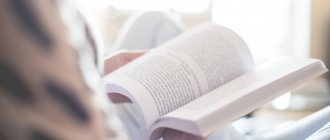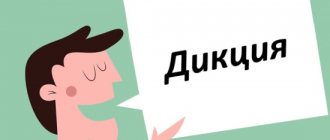Many people believe that intelligence only includes erudition and logical thinking. In fact, this concept is more multifaceted.
Intelligence consists of different components and is closely related to cognitive abilities: perception, attention, thinking and speech. It can be spatial, emotional, strategic... And these are just some of its types.
Learning, adaptation, understanding of various processes, application of experience, personal success - all this is impossible without developed intelligence.
At the same time, intelligence is not given to us at birth, it must be constantly developed, and our selection of books will help you with this!
You will learn to go beyond the ordinary and have the opportunity to change your thinking, and with it your life.
“Russian with a dictionary” – Irina Levontina
Irina Levontina wrote her observations about changes in the Russian language for several years in the form of separate articles, and then published them in a separate collection. The book immediately became a bibliographic rarity and only the reprint can be purchased at an affordable price. This alone can speak about the quality and necessity of such notes. Irina, with humor and even some joy, welcomes the fact that language does not stand still, but lives and changes. Unlike linguists of the old school, who are sad and claim every year that the language is becoming poorer, Irina Levontina is convinced of the opposite. The main thing is to understand how to use all these new words and phrases, she argues, then the speech will remain lively and rich.
“How to Talk to Anyone, Anytime, Anywhere” - Larry King
This book is not about the Russian language and not about speech as a linguistic phenomenon. And not even about speech technique or oratory. This is the unique experience of a person who wants to teach us to speak, and not be silent, not to be shy and not to be shy - at the same time to speak beautifully, intelligently and well. For the Russian reader, the examples from the book are somewhat Americanized, but much can be taken into account and used in everyday communication.
"Brain Plasticity" Doidge Norman
The brain is largely responsible for intelligence and everything else depends on its well-functioning functioning. For example, after a stroke, complete recovery is possible only due to the fact that the work of the damaged areas is completely taken over by the remaining intact neighboring parts. In addition, the brain can be trained just like muscles in the gym. Also, one of the revolutionary discoveries was the fact that thought can change the structure of the brain. Moreover, negative thoughts have a similar destructive effect, and a positive attitude can help develop the efficiency of the most important organ in the body. The book describes in detail all these features, and also tells how you can use them for the benefit of your intellect and the body as a whole.
“Eight rules of efficiency. Smarter, Faster, Better" Charles Duhitg
Charles Duthig is back on the list with another worthwhile read, Smarter, Faster, Better. The author invites the reader to prioritize 8 main issues that need to be addressed, and suggests methods for finding these solutions. He bases his recommendations on neuroscience research. Roughly speaking, this science studies behavior, the concept of willpower, motivation, happiness, depression and more. The author talks interestingly about motivation. Having studied all this, you can significantly develop your intellect, as well as qualitatively change your life.
“Neurology: What Explains Strange Behaviors” by Eliezer Sternberg
This book will help you look into the human mind. The creator of the work is Dr. Sternberg, which should increase the level of confidence in the material offered for reading. In the process of reading, you can find a connection between the conscious and subconscious. The work of a doctor will help answer the questions: why does a person hear voices in his head or see hallucinations; why ideomotor training works; why a person forgets what many others do not want to remember.
“Alive as life” – Korney Chukovsky
The Soviet writer Korney Ivanovich Chukovsky wrote not only famous poetic fairy tales for children, but also “popular non-fiction,” although he himself would have condemned this term. “Alive as life” appeared at a time when office (the language of bureaucratic conversations and papers) began to dominate in the Russian language, and foreign words began to actively replace Russian analogues. Now the situation with foreign words is exactly the same, but clerical and memorized phrases are still taught at school. So Chukovsky’s book, even at an older age, will help you get rid of bad language habits.
Why are books needed for intelligence?
In order to pump up your brain, you don’t need to visit doctors and psychologists; scientific and psychological literature will help in this matter. To increase your intelligence, you don’t need to waste energy and time reading ordinary, mediocre books; it’s better to buy a complex, meaningful manual.
“Artificial memory,” continues the anonymous author, has two basic components: images and places. Images represent the content of what a person wants to remember. The places—or loci, 30 as they are called in the original Latin—are where these images are stored. The idea is to first mentally recreate a space that you know well and can easily imagine, and then fill that imaginary space with images of what you want to remember. The Romans called this method the method of places. Later they began to call it the palace of memory.” (Einstein walks on the moon. The science and art of memory)
“The brain is capable of storing only connections; objects in the surrounding world and products of brain activity contain connections. There are connections in the apple. The connections are in the telephone number and historical date. What is primary: the object or the connections located in it? This is a difficult philosophical question. So let's skip it. The main thing for us is that the brain only records connections. The rest is not important for memorization.” (Textbook of Mnemonics)
These quotes from different books reflect the essence of the problem. This literature develops thinking, promotes active brain function, and also improves memory. Let's consider which books for developing intelligence and vocabulary can help you.
“Do we know Russian?” – Maria Aksenova
In fact, Maria Aksenova has a whole series of three books entitled “Do We Know Russian?”, but if you like the first one, then you’ll pay attention to the other two. The author takes a thread from the world and writes about all the interesting things from linguistics, philology, spelling and even journalism that are associated with the correct or incorrect use of language norms. As the name suggests, the main emphasis is on mistakes, and mistakes that are most often funny or unexpected. The only negative that is often attributed to the author is the abundance of exclamation marks. What can you do, she reacts very emotionally to mistakes in her beloved native language.
Editions for preschoolers and schoolchildren
Speech is an important stage in a child's development. It helps you learn about the world faster and study better at school. To speed up your baby’s speech development, you can use special literature. Children's books on speech development should interest a preschooler. For this purpose, children's literature is enriched with bright sketches. The text should be easy to understand so that the child does not get tired of reading.
For children under 3 years of age, books contain less text and more drawings. The work is read together with the child. When parents read, the baby looks at the pictures, turns the pages, worries, and rejoices for the hero described in the book. It is recommended that the child read the text clearly and expressively. After reading, it is recommended to ask questions so that the child tries to remember what was discussed in the book, learns to correctly express his thoughts, pronounce words and sentences. It is better to turn the learning process into a game. This will make it easier for the child to perceive the material.
Today there is a very wide variety of books for the speech development of children at home. Special manuals are produced for parents and teachers. Printed versions of fairy tales, poems, and thinking exercises are sold for preschoolers and schoolchildren. They are equipped with illustrations. Audiobooks are also available for young readers.
Types of children's publications
| Name | Author | Description |
| A large album on speech development for little ones | Olga Novikovskaya | The publication contains pictures and thinking tasks. It creates the correct reproduction of sounds and improves vocabulary. |
| Help your baby talk | Elena Yanushko | The publication is intended for an audience of 1-3 years of age. Contains games, tasks, and exercises that develop the speech function of young readers. |
| A big book of tasks and exercises for the development of a child’s coherent speech | Tatiana Tkachenko | The work contains more than 100 tasks and exercises for the formation of speech function. The child composes stories during class. This method, according to Tatyana, is considered the most effective in stimulating a child’s speech development. |
| Lessons on correct speech and correct thinking | Nadezhda Zhukova | Children's publication that increases interest in reading. A preschool child studies the fables of I. A. Krylov. |
| Development of speech and cognitive abilities of a preschooler | Svetlana Karpova, Victoria Mamaeva | A textbook for improving memory, attention, speech perception. The book is designed for an audience of preschoolers aged 3-5 years. |
| Development of a child's vocabulary | S. Plotnikova | A publication for parents and teachers. It reveals speech defects, ways to correct speech, and replenish your vocabulary. |
| Expanding the vocabulary of children 2-4 years old | Tatiana Kulikovskaya | A textbook for healthy babies and children with speech disorders. |
“The Russian language is on the verge of a nervous breakdown” – Maxim Krongauz
Maxim Krongauz, being a linguist, closely monitors changes in the Russian language and tries to reconcile Internet language and literate speech according to all the rules. Unfortunately, his book “Albany Self-Teacher” was somewhat late. It was published when Albany slang was already a thing of history. But “The Russian Language on the Verge of a Nervous Breakdown” will remain relevant for a long time, as it talks about fundamental changes in the modern language, the most common mistakes that appear even in the media, as well as how to prevent the depletion of vocabulary in the era of simplification and speed of information delivery.
"Ignite Yourself" John Ratey
The author of this book is a doctor and psychiatrist. This gives the content of the book special value for the reader. John Ratey argues that physical activity stimulates human intellectual development. By engaging the body's systems in exercise, neurochemicals are produced that are essential for brain health. The nervous system is strengthened, depression and panic attacks are prevented. Sports will also help eradicate bad habits and avoid early aging. All this will allow you to effectively develop the capabilities of your brain.









